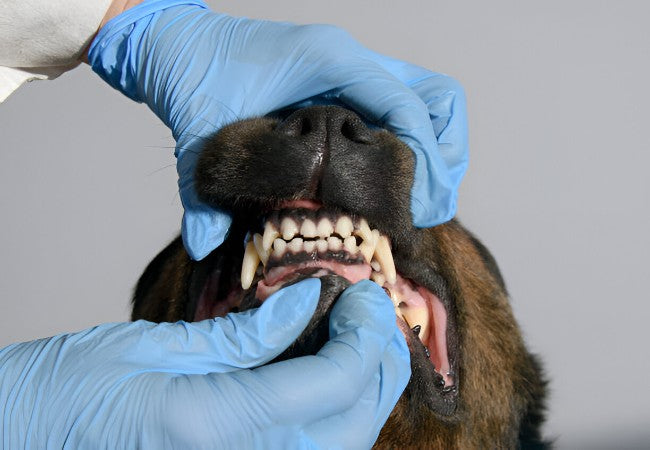Vet’s 2025 Guide to Masticatory Myositis in Dogs 🩺🐶

In this article
🩺 Vet’s 2025 Guide to Masticatory Myositis in Dogs 🐶
By Dr. Duncan Houston BVSc
Masticatory myositis (MMM) is an autoimmune condition where the dog's immune system targets the chewing muscles—temporalis, masseter, and pterygoid—leading to jaw pain, swelling, and eventual muscle wasting. This 2025 guide covers causes, signs, diagnosis, treatment with steroids and immunosuppressants, prognosis, and home care—enhanced with support tools from Ask A Vet. 🐾
1️⃣ What Causes MMM?
Dogs develop antibodies against unique muscle fibers (type 2M) found only in jaw muscles. The exact trigger is unknown, but factors like infection, stress, vaccination, or genetics may play a role.
2️⃣ Who Is Affected?
Most commonly seen in large breeds—German Shepherds, Retrievers, Dobermans, Cavalier King Charles Spaniels, Weimaraners—but it can occur in any breed or age.
3️⃣ Clinical Signs
Acute Phase
- Swollen, painful jaw muscles; reluctance to open the mouth or yawn.
- Exophthalmos, protruding third eyelid, fever, drooling, difficulty eating.
Chronic Phase
- Muscle atrophy, fibrosis, and trismus ("lockjaw")—the jaw stays partially closed.
- Weight loss due to difficulty eating; potential aspiration pneumonia if swallowing compromised.
4️⃣ How It's Diagnosed
- 2M antibody ELISA test: highly specific, but best before steroids start.
- Muscle biopsy: assesses inflammation and fibrosis; needed in advanced stages.
- CK & physical exam: muscle swelling, pain, and jaw movement assessed.
5️⃣ Treatment Strategies
🐾 Immunosuppressive Therapy
- Prednisone: start at 1 mg/kg twice daily; taper over months based on recovery.
- Second-line drugs: azathioprine or cyclosporine if side effects limit steroid use.
- Soft or slurried diet, syringe feeding; pain relief and anti-inflammatories included.
🌀 Physical Rehabilitation
- Encourage gentle jaw movement—e.g., chew toys—to prevent fibrosis.
- Avoid aggressive jaw stretching under anesthesia—it risks fractures or luxations.
6️⃣ Prognosis & Follow-up
- With early treatment, 90 – 91 % regain normal jaw function within 4 weeks to 2 months.
- 30 – 27 % may relapse—managed by restarting or maintaining low-dose steroids or adding immunosuppressants.
- Chronic fibrosis can limit full recovery; prognosis depends on muscle damage extent.
7️⃣ Supportive Care & Brand Integration
- Ask A Vet: Telehealth support for taper guidance, symptom tracking, and adjusting meds.
8️⃣ . When to Contact the Vet Immediately
- Severe lockjaw is preventing eating/drinking.
- Fever, pneumonia signs, drooling or choking.
- Re-emergence of symptoms during taper.
- Extreme steroid side effects (PU/PD, infection, lethargy).
🏁 Final Thoughts
With prompt, aggressive treatment starting in the acute phase, most dogs with MMM recover jaw function within weeks. Ongoing care, including jaw exercises and slow medication tapering, is vital to avoid relapse. Plush comfort via Ask A Vet, supports recovery into 2025 and beyond. Early detection is the key to the best outcomes. 🐶❤️
Need help managing taper schedules, feeding strategies, or monitoring jaw recovery? Visit AskAVet.com and download the Ask A Vet app—veterinary expertise at your fingertips. 📱🐾






